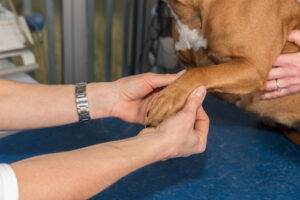By Teresa Martinoli, DVM
This is a common question asked by horse owners every fall and winter. The short answer: Probably not!
Most horses do NOT need to be blanketed. Horses are naturally equipped to handle cold weather, and do not get cold nearly as easily as us humans do. Their long and thick winter coat can “puff out” when it’s very cold outside, and the air between the hairs acts as an insulator. This natural insulation does a better job keeping them warm than a sheet or light blanket can; those cause the hair to flatten out, therefore preventing the “air” insulation layer.
The ones that may need blanketing include newborn foals, thin or debilitated horses, sick horses (possibly) and, of course, body clipped horses. One possible exception to healthy, hairy horses needing a blanket is if they do not have adequate shelter in their field and there is a cold rain causing them to get chilled. Horses with a nice shed available to get out of bad weather typically do fine all winter without blankets.
If you do decide to blanket, here are some blanketing basics:
Be sure the blanket fits properly! An improperly fitted blanket can cause rubs, muscle soreness, and even lameness. One that is too large may cause the horse to get tangled in the straps, or even for the straps to get caught on fences, gates, or buckets, causing injury. (If the straps are too long, try tying them in knots to shorten them.)
Be sure the horse isn’t too hot! They get warm a lot easier than we do, so just because you need a jacket does NOT mean the horse needs a blanket. Many horses end up sweating under their sheets and blankets, which can lead to them actually catching a chill when the temperature drops, or to them getting skin disease, or sick.
Take the blanket off periodically (AT LEAST twice a week) to examine the horse’s weight, and check for any cuts, scrapes, or skin problems. Every spring I see thin horses who were wearing a blanket all winter that prevented the owners from realizing how thin they had become.
Make sure the blankets are still waterproof! Sometimes they look soaked on the outside but are dry next to the horse; this is OK. However, if you find the horse is wet along their topline or shoulders despite being blanketed, you’ll need to re-waterproof it or replace it.
If you are unable to check/change blankets up to twice daily if necessary, then I would recommend NOT blanketing at all. More damage can be done if the horse gets overheated, if he gets caught up in the blanket, if the blanket has slipped or is not fitting properly, or his weight is not being monitored properly, than if the horse is not blanketed at all.




